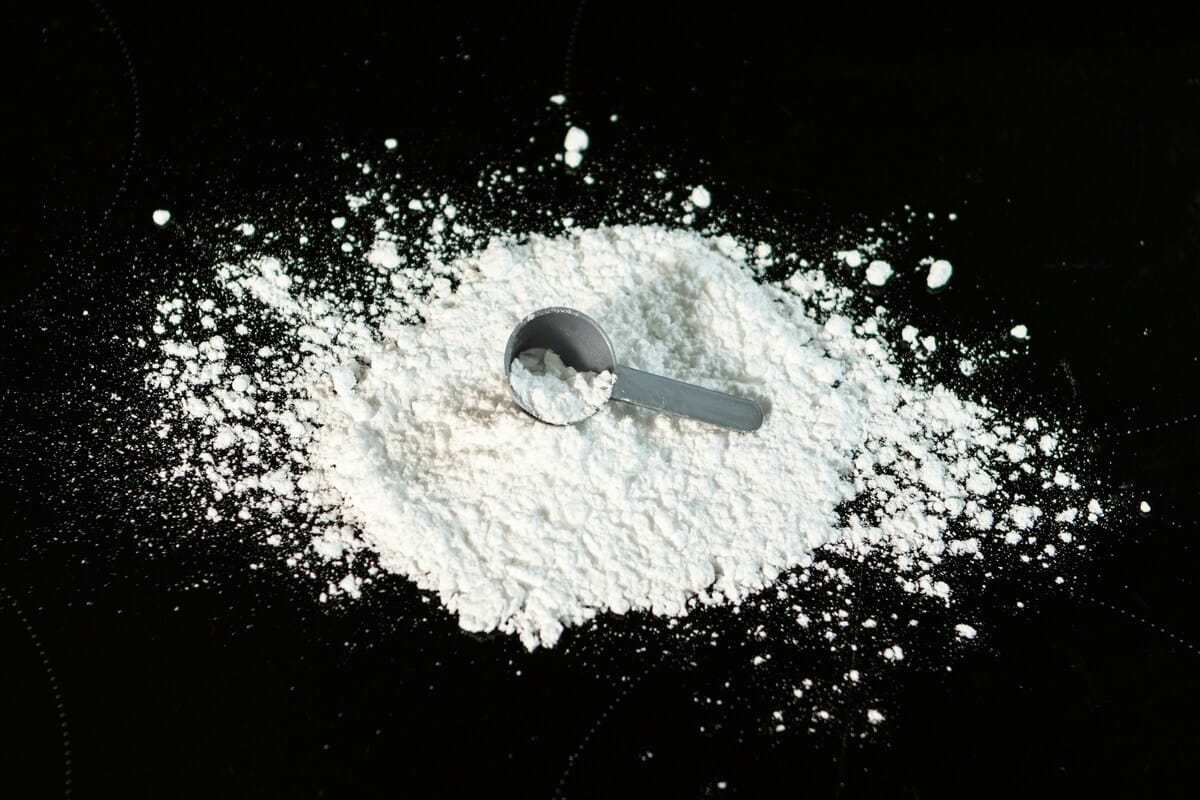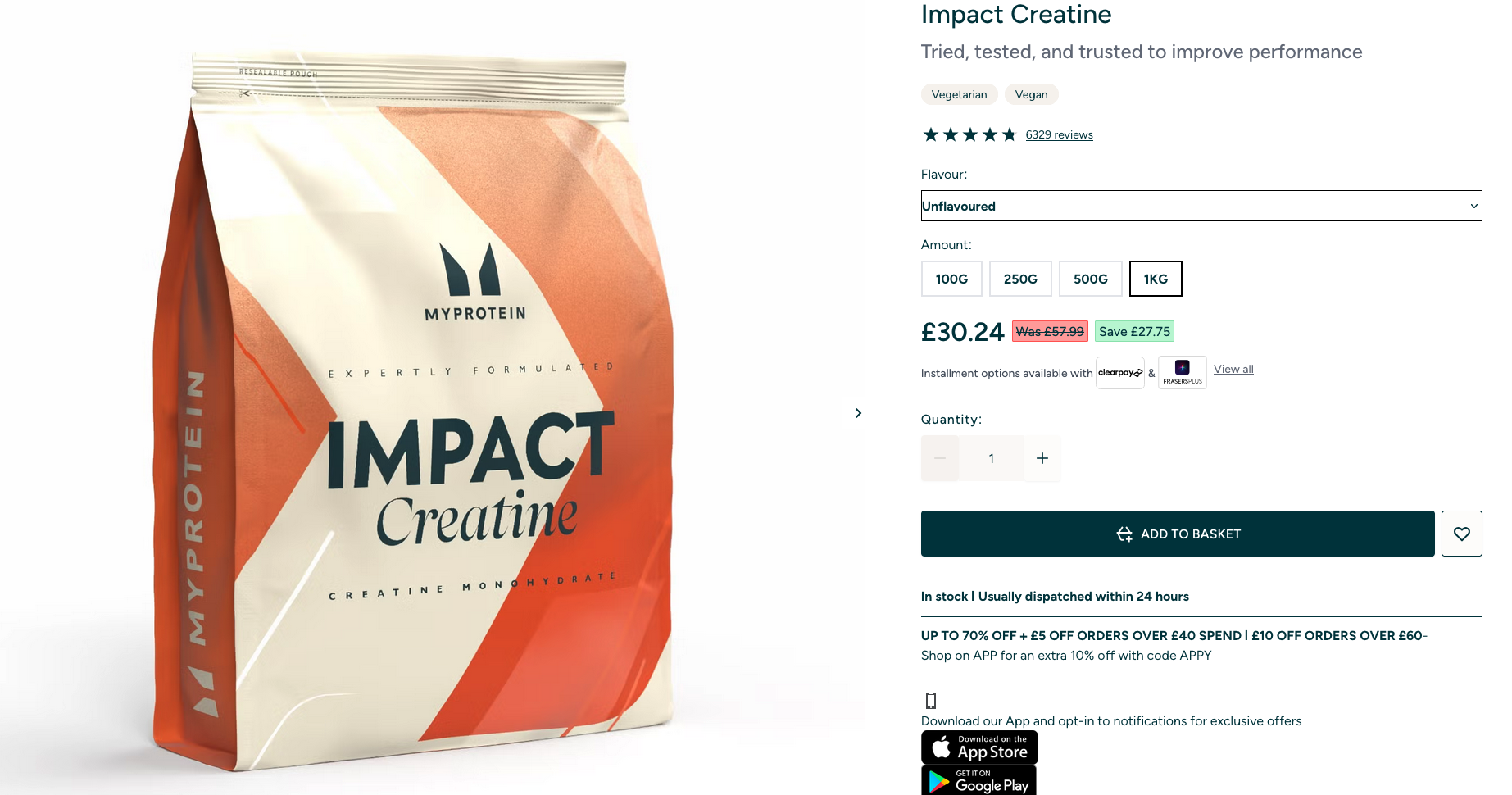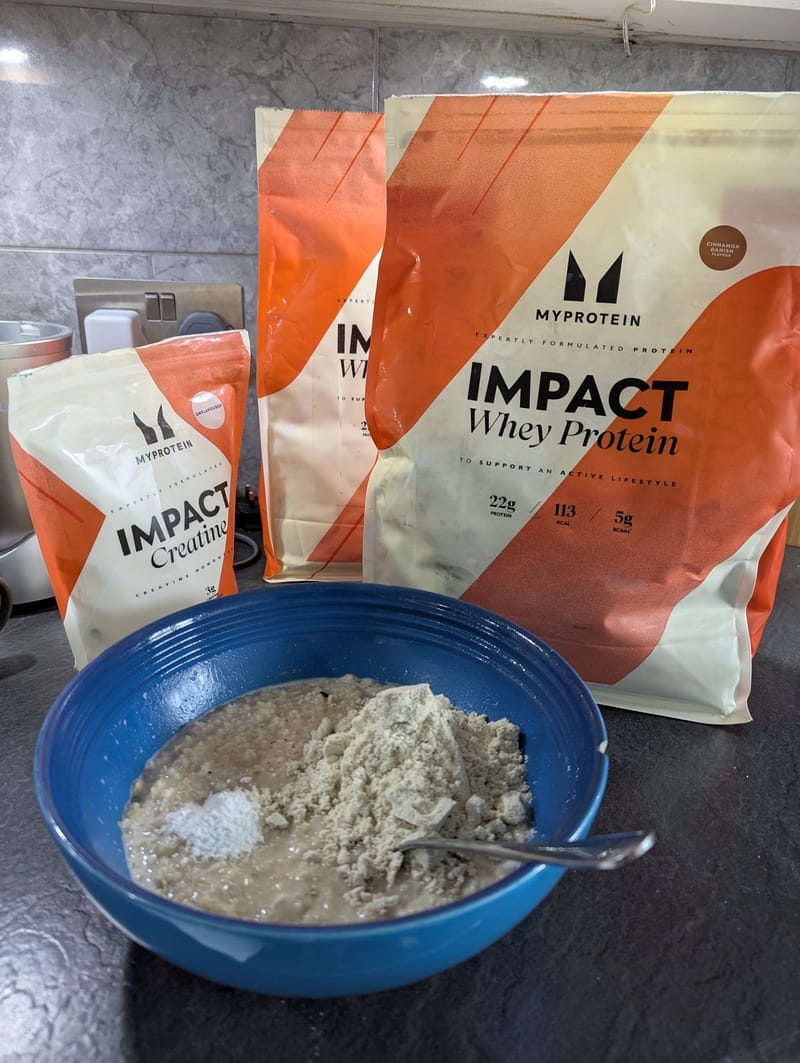Can you mix creatine with protein powder? (The truth)


Yes, you can mix creatine and protein powder together. You’re very unlikely to see any negative side effects, though in rare cases, some people might experience digestive distress when ingesting large amounts of one or both supplements.
What is creatine?
Creatine monohydrate is a stable, powdered form of creatine that occurs naturally in some animal products, including beef.
Creatine is a molecule that plays an important role in energy production.
When the body uses it, it splits into ADP (adenosine diphosphate) and adenosine monophosphate.
Creatine donates a phosphate group to the ADP, converting it back into ATP, which can then be used for more energy.
Creatine therefore helps the body recycle used energy molecules back into usable ones.
ATP is particularly important in high intensity exercise, and strength and power sports. This makes creatine useful for bodybuilders, powerlifters, and other gym goers looking to increase their performance in the gym.

Advantages of taking creatine
1) Increased power output in resistance training
Since it’s stored in the muscles, and is directly involved in the regeneration of ATP from ADP for energy during high-intensity exercise (like resistance training), regular creatine supplementation helps increase your performance while you’re lifting weights.
This is a very well-researched phenomenon, but the increases in your performance will probably be subtle. Taking creatine won’t make you feel superhuman, but it will probably help you take an extra rep here or there during your workouts.
2) Modest increases in muscle mass
Being able to train closer to true muscular failure means more effective, stimulatory reps in each set.
This means greater activation of the largest muscle fibres, which are the ones with the highest growth potential.

The more stimulation these muscle fibres get, the more of a hypertrophic response you’ll see (up to a point).
By enabling you to get more effective reps, creatine can result in greater gains in muscle mass over time.
3) It's the most studied supplement of all time
Creatine is the most studied supplement of all time. Its effects are very well-proven, and it’s known to be incredibly safe.
In an industry plagued by fad supplements full of unproven ingredients and big promises, creatine is one of a handful of supplements you can feel safe putting your money on.
4) Low-cost
For something with proven effects that’s as well studied as this, creatine is very inexpensive.
At the time of writing a kilogram of creatine monohydrate costs just £48. During one of the online sales that supplement suppliers frequently run, it’s even cheaper.
Considering the standard daily dose is 3-5g, 1kg will last you at least 200 days. For a supplement with such proven benefits, this makes it a no-brainer.

5) Brain and body benefits
Alongside its positive effects on exercise performance, there’s also some evidence that supplementing with creatine could benefit the brain. Especially with memory and mental fatigue.
Evidence for this is strongest in those who might, as a result of genetic or dietary disposition, be relatively deficient in creatine. This includes vegetarians and vegans, older adults, and those with creatine deficiency syndrome.[1]
There’s also growing evidence that creatine supplementation can ease symptoms in people with depression. Interestingly, this evidence is stronger in women than in men.[1]
How much creatine should you take?
During a creatine loading phase (see above), people should take about 25-30 grams of creatine a day for the first week.
Split this into three or four smaller doses to lower the risk of stomach upset.[2]
After a week of creatine loading with 25-30g of creatine supplementation per day, most people’s muscles will be sufficiently loaded with creatine. Now, you can drop to a maintenance dose.
The real question is, how large or small should this maintenance dose be?
Most studies use maintenance doses of at least 0.03g/kg of bodyweight per day. For a 90 kilogram male, this would mean a maintenance dose of at least 2.7g per day.[2]
However, athletes with higher activity levels and increased performance demands, as well as gym goers with higher-than-normal levels of muscle mass, may benefit from amounts higher than this.
I personally supplement with five grams of creatine per day, though there’s some evidence that certain populations may benefit from as much as 10 grams of creatine supplementation per day.
What is creatine loading?
“Creatine loading” refers to a preliminary phase where, when first taking creatine, you “load” the supplement by taking a very high dose (about 0.3 grams per kilogram of bodyweight) every day for the first week.
While it’s not necessary to load creatine for a week to see its benefits, it takes about a month to experience its benefits without this loading period.

What is protein powder?
Protein powder is a dry, powdered food supplement with high protein content. People use it to boost the protein content of their diet.
Protein powder is made from different food sources, depending on the type.
Whey and casein protein powders, for example, are made from cow’s milk. Some varieties of these supplements are, therefore, unsuitable for those with lactose intolerance or milk allergies.
Vegan varieties are made from ingredients like peas, rice, beans, seeds, or a combination of these ingredients.

Benefits of protein powder
1) Bolster dietary protein intake
Upon hearing they should aim for a protein intake of one gram per pound of bodyweight to maximize muscle growth, most people are shocked.
Especially once they audit their existing protein intake and find they’re eating fewer than 80 grams of protein per day, which isn’t uncommon.
Adding protein powder into the diet is a quick, inexpensive way of reaching higher protein targets.
2) Boost muscle protein synthesis
Of all protein powders, whey protein is particularly high in leucine.
Leucine is an amino acid that is particularly effective at triggering muscle protein synthesis, which is necessary for the growth of new muscle tissue.
Therefore, including whey protein as a regular part of your diet could keep muscle protein synthesis elevated more frequently, for longer. Over time, this could result in greater increases in muscle mass.
3) Increase muscle growth
Increased muscle mass has all kinds of benefits, including a higher resting metabolic rate (meaning more calories burned while at rest), and greater mobility and health into old age.
Training with weights without eating sufficient protein is likely to result in lower increases in muscle mass than training while eating higher amounts of protein.
Those looking to maximize their rate of muscle growth while training with weights should aim to eat 0.7-1.0 grams of protein per pound of bodyweight a day.[3]

Downsides of combining creatine and protein powder
1) Weight gain
One fast and noticeable side effect of creatine loading is weight gain.
Creatine is an osmotically active substance, and leads to increases in total body water weight.
While creatine is mostly stored in skeletal muscle, the increases in total body water don’t seem to be concentrated in the muscle cells. Water distribution in the body remains stable, and seems to increase both inside and outside the cells simultaneously.[4]
2) Stomach upset
If you’re mixing both creatine and protein powder into food at the same time, bear in mind that both absorb a lot of water.

So if, for example, you’re mixing 8 grams of creatine and 60 grams of whey protein powder into 80 grams of cooked oats with water, you’ll need significantly more water than normal to offset all the water the creatine and protein powder absorb.
However, if you’re loading creatine (see below), and are sensitive to the protein powder you’ve chosen (for instance, if you’re mildly lactose intolerant and taking large amounts of whey protein concentrate), you’re more likely to experience some digestive discomfort.
When should I take creatine and protein powder?
You can take your creatine and protein powder whenever you want. That’s true whether you take them together, or separately.
As for timing of creatine supplementation, there are reasons to suspect that supplementing immediately pre-workout, or even during the workout itself, might result in the greatest uptake of creatine into skeletal muscle. However, there’s little strong supporting evidence for this yet.[5]
Far more important for creatine supplementation is the consistency with which you take it. So long as you take it every day, you’ll continue benefiting from its effects.
There’s also nothing magical about protein powder. It’s just additional protein. Far more important is total protein intake throughout the day.[6]
References
- [1] Forbes, Scott C et al. “Effects of Creatine Supplementation on Brain Function and Health.” Nutrients vol. 14,5 921. 22 Feb. 2022, doi:10.3390/nu14050921
- [2] https://examine.com/supplements/creatine/#dosage-information
- [3] Aragon, Alan. Flexible Dieting: A Science-Based, Reality-Tested Method for Achieving and Maintaining Your Optima l Physique, Performance & Health (p. 157). Victory Belt Publishing. Kindle Edition.
- [4] Powers, Michael E. et al. “Creatine Supplementation Increases Total Body Water Without Altering Fluid Distribution.” Journal of athletic training vol. 38,1 (2003): 44-50.
- [5] Ribeiro, Felipe et al. “Timing of Creatine Supplementation around Exercise: A Real Concern?.” Nutrients vol. 13,8 2844. 19 Aug. 2021, doi:10.3390/nu13082844
- [6] Aragon, Alan. Flexible Dieting: A Science-Based, Reality-Tested Method for Achieving and Maintaining Your Optima l Physique, Performance & Health (p. 126). Victory Belt Publishing. Kindle Edition.
